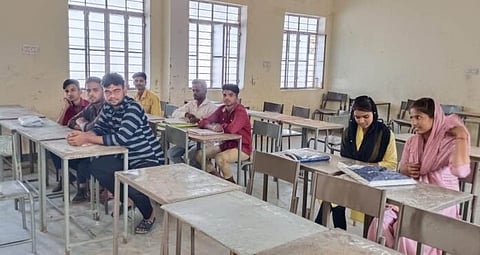
Jaipur- In a deeply troubling incident that transpired in Jaipur in late December, a Brahmin professor allegedly subjected a tribal student to severe mental harassment, drawing attention to the pervasive issue of caste-based discrimination within educational institutions. The student, purportedly singled out due to anti-reservation sentiments, endured not only segregation but also casteist remarks from fellow upper-caste students.
The situation reached a distressing climax when the Brahmin teacher, having humiliated the tribal student, instructed them to leave a seminar hall, leading to an anxiety attack. Tragically, the student responded to the mental distress by reportedly overdosing on prescribed pills.
The incident sheds light on the broader issue of discrimination in educational spaces in Rajasthan, where instances of such nature occur regularly.
According to the 2021 All India Survey on Higher Education (AISHE), Jaipur secured the second position nationwide for having the highest number of colleges in the district, with a total of 671 institutions. Government data from CEIC indicates that 712,497 students are currently enrolled in government colleges in Rajasthan.
The current reservation in the state is distributed as follows: 21% for Other Backward Classes (OBCs), 16% for Scheduled Castes (SCs), 12% for Scheduled Tribes (STs), 10% for Economically Weaker Section (EWS), and 5% for More Backward Classes (MBC). In August 2023, the Rajasthan government increased the reservation for OBCs from 21% to 26%, raising the overall reservation in the state from 64% to 70%, surpassing the 50% limit established in the 1992 case, Indra Sawhney v Union of India.
In the fiscal year 2023-24 budget, former Chief Minister Ashok Gehlot unveiled a financial initiative targeting the advancement of research scholars in government colleges and universities. This scheme promises to provide financial support of up to ₹25,000 to 3,800 research scholars, facilitating their active participation in internships, seminars, workshops, and conferences organized by prestigious higher educational institutions and research centers across the nation. Furthermore, research scholars in Rajasthan who have successfully cleared the NET/SLET examination but are not currently receiving any fellowship are eligible to receive a monthly stipend of 20,000 rupees. Notably, this stipend surpasses the fellowship provided by central universities, which stands at 8,000 rupees.
Despite these commendable efforts to bolster financial support, challenges persist as microaggressions related to gender, class, caste, and religion persist among colleagues and students in the upper echelons of academia. These subtle yet impactful forms of discrimination significantly affect the mental health of individuals involved, undermining the intended positive impact of the financial support initiatives.
Specifically, the allocation of PhD guides based on surnames perpetuates segregation, with upper-caste teachers showing a preference for scholars from their own community, while upper-caste scholars tend not to seek mentorship from Dalit and Adivasi teachers. This segregation at the doctoral level in Rajasthan becomes a hindrance to the overall quality of research.
A distressing incident underscores this challenge: a senior retired professor at an educational institution reprimanded a reserved candidate who secured admission under the general quota, despite having achieved higher marks than unreserved candidates. Unfortunately, this incident is indicative of a recurring pattern where reserved scholars continue to be treated differently, even after the provision of financial support by the state government.
Suicides among SC/ST students and physical/mental assaults from upper-caste teachers in Rajasthan are a concerning trend. Data from the Rajasthan police reveals an increase in cases registered under the SC/ST (Prevention of Atrocities) Act, with crimes against Dalits and Adivasis rising at an average rate of 22% from 2018 to 2022.
On a national scale, incidents such as the suicides of Darshan Solanki, an IIT Bombay B Tech student, Dr. Preethi, a scheduled tribe (ST) student from Hyderabad who tragically took her own life after facing ragging, and Pamposh, a scheduled caste MBBS student in Amritsar, underscore an alarming trend of increasing hostility and resistance to anti-caste narratives on campuses. Chief Justice of India, D Y Chandrachud, expressed distress over the suicides of students from marginalized communities in top institutions on February 26, 2023, highlighting a concerning pattern, prompting the need for scrutiny.
The incident in Jaipur brought attention to the suppression of complaints by marginalized students, particularly Dalit and tribal students from rural Rajasthan. Despite dedicated portals and SC/ST grievance redressal mechanisms, these students refrain from filing complaints due to biases. The response to the incident exemplifies this, as the grieved tribal student opted not to complain, citing fear of judgment and repercussions on their work ethic.
The academic environment perpetuates discrimination, with scholars from Rajput and Brahmin communities proudly proclaiming their lineage, while scholars from Dalit and Adivasi communities feel compelled to conceal their caste identity. This creates an atmosphere of social inequality, undermining constitutional principles of freedom of speech and expression. Marginalized students endure mistreatment, impacting their mental well-being.
The academic atmosphere fails to subvert stereotypes, with scholars concealing their identities in confined spaces. A senior Indian professor based in America noted the deteriorating academic culture in Rajasthan, expressing shock at the incident. The question arises: Shouldn't academia promote inclusivity and diversity, challenging stereotypes instead of perpetuating them?
To foster research in Rajasthan, special emphasis on scholars' mental well-being, alongside the announced financial support, is crucial. Efforts are needed for a more inclusive and supportive environment, free from biases. A reevaluation of mechanisms addressing caste discrimination within academic settings is imperative, with a resolute condemnation of harassment and discrimination, ensuring no acceptance in educational institutions or any other environment.
The author Priyanka Meena is an Independent Researcher working on Translation and Feminist issues in Rajasthan
Also Read-
You can also join our WhatsApp group to get premium and selected news of The Mooknayak on WhatsApp. Click here to join the WhatsApp group.